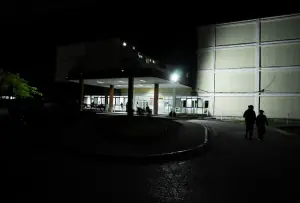North Korea stages nuclear strike drill to protest allied exercises
3 min readNorth Korea conducted a simulated “scorched-earth” nuclear strike on targets across South Korea, state media reported on Thursday, in reaction to allied exercises that it said amounted to plans for a preemptive nuclear attack by the United States.
The state media reports spelled out in unusual detail how the North envisions a potential war, including countering any attack by striking the South with nuclear weapons, then sweeping in to occupy its territory.
“The KPA staged a tactical nuclear strike drill simulating scorched-earth strikes at major command centers and operational airfields of the ‘ROK’ military gangsters on Wednesday night,” the general staff of the North’s Korean People’s Army (KPA) said in a statement carried by KCNA news agency. ROK is the initials of South Korea’s official name, the Republic of Korea.
North Korea fired two short-range ballistic missiles into the sea on Wednesday, South Korea’s military said, hours after the US deployed B-1B bombers for allied air drills.
South Korea’s presidential office convened a security meeting after North Korea’s late-night launch, which followed its second failed attempt last week to put its first spy satellite into orbit.
“These conducts pose threats to peace and stability of not only our country, but of the region and international community, and cannot be tolerated,” Japanese Prime Minister Fumio Kishida told reporters.
Japan will intercept North Korea’s missiles if they fly over Japan’s territory, Japan’s Chief Cabinet Secretary Hirokazu Matsuno said.
Pyongyang has vowed to try launching a satellite again in October. The United States, South Korea and Japan have condemned the space launch as a provocation and violation of UN Security Council resolutions banning the North’s use of ballistic missile technology.
The launches late Wednesday came a day before South Korea and the U.S. were set to wrap up 11 days of combined military drills, which Pyongyang has long denounced as a war rehearsal.
North Korean leader Kim Jong Un on Tuesday observed part of a drill that involved the commanding officers and staff sections of the entire army, aimed at preparing them for an all-out war with the South, KCNA reported.
The drill simulated repelling a sudden invasion, then launching a counter-attack to occupy “the whole territory of the southern half”, the report said.
The simulation included frontline and strategic reserve artillery forces, plans for forming a front behind the enemy lines, disrupting the entrance of “outside armed forces” into the conflict, and “making simultaneous super-intense strikes at the pivotal military command centers, military ports, operational airfields and other important enemy military targets,” KCNA said.
“We strongly condemn Kim Jong Un explicitly revealing his intention for a military attack on us using the annual defensive South Korea-U.S. combined drills as a pretext,” Seoul’s unification ministry handling inter-Korean affairs said in a statement.
Kim has been urging his military to step up war preparedness, criticising leaders of the United States, South Korea and Japan as “gang bosses” who increase the risk of a nuclear war in the region.
The North’s first missile reached an altitude of 50 km (31 miles) and flew 350 km, while the second one rose as high as 50 km and flew 400 km, Japan’s defence ministry said.
For the latest news, follow us on Twitter @Aaj_Urdu. We are also on Facebook, Instagram and YouTube.



























Comments are closed on this story.